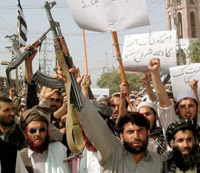Globalization targets Islamic fundamentalism
Several events that took place last week can make one think yet again of the fate of Islamic fundamentalism in the modern world. The problem becomes especially clear when it comes to Islamic societies. For example, severe clashes between students and the police in Tehran were reported last week. The clashes erupted following the authorities’ recent campaign to crack down on dissent in universities.

Students who share the Western values and seek more freedom are expelled from universities while university professors who dare speak out for the need of a greater dialogue with the West are at times sent to jail. But the conflict between the theocratic authorities and a considerable part of Iranian society remains. That part of society advocates less stringent observance of the Islamic norms. One should not believe that such a conflict is a day-by-day reality occurring only in the Islamic Republic of Iran, which is known for its intent to defy a larger part of the international community. A similar conflict is also taking place in those Islamic states that do their best to pass as respectable members of the international community.
Saudi Arabia is particularly relevant to the case. The Saudi officials and clergy take any opportunity to state that terrorists violate the norms of Islam. At the very least, the assertion is open to debate. Muslims have not any head similar to the Pope, the one who could make a final decision as to the right or wrong. Every Muslim has to make a judgment for himself. But that is not the point at the moment. The thing is that U.S. Department of State could theoretically find as many human rights violations in a friendly Saudi Arabia as it actually does in a hostile Iran.
At first sight, things have recently started to get better in Saudi Arabia. For example, last week’s reports say that the government intends to curtail virtually absolute power of the special police whose job is take drastic measures against those who fail to observe the Islamic norms on a daily basis. It is still unclear whether the authorities deliberately and voluntarily aim at softening the regime or they could not but take action due to mounting opposition of the population. Some reports indicate that lately the common Saudis have been standing up to the minders more frequently than before. The common Saudis are apparently angry at the religious police interfering in their privacy.
The religious police force needed reforming, it was clear a long time ago. Following the religious regulations sometimes bordered on sheer absurdity. Fourteen girls died in a fire in 2002. The religious policemen arrived in location. But they did nothing to rescue the poor girls, they did not let any other people approach the burning building either. According to those keepers of morals and religious purity, no one save the girls’ male next of kin was allowed to rescue the ill-starred ones.
These days the Saudi powers that be hate to be seen as the embodiment of religious obscurantism. The authorities stress the ongoing changes over and over again. But changes do not always mean progress. The Saudi history textbooks still maintain that Christians and Jews are the enemies of the true followers of Islam, and therefore a zero-tolerance attitude is perfectly justified. The Saudis even took some countermeasures to underplay the heated criticisms in the Western media. The Saudi ambassador to the United States made a statement last week. He promised that a model university would be set up in the kingdom. And students of the university will be using different textbooks. In other words, no reform lies in store for any other institutional educations.
However, such a policy pursued by the Saudi authorities for the purpose of “prevention and demonstration only” has its limits. Globalization can spill over any borders in one way or another these days as Saudi Arabia is being forced to become a more open country due to economic reasons. Anyway, women’s conduct at home and in society is no longer severely regulated in accordance with the Islamic law. The softening of the regime may continue even if the authorities will try to block it.
Politcom
Translated by Guerman Grachev
Pravda.Ru
Subscribe to Pravda.Ru Telegram channel, Facebook, RSS!


